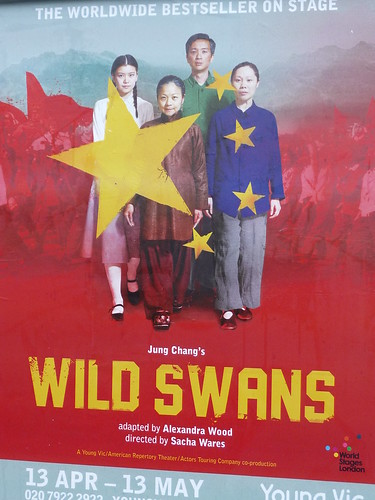Wild Swans
I’ve already mentioned that I’m a big fan of Jung Chang’s work, and I booked up months ago to see the first ever stage version of Wild Swans during its stint at the Young Vic, in London. The play starts brilliantly, with the full cast on stage acting out a market scene as the audience enter the theatre and take their seats. It’s a lovely, involving, image and sets the scene for the remainder of the play, which makes the very most of the visual and physical. The stage changes dramatically through the course of the play – with soil and subsequently water covering the stage. The backdrop of the stage is used to particularly good effect – initially covered with a bamboo screen, peeled back to reveal a blank canvas, the blank walls are then physically covered in water by the cast, and (in the same style as children’s magic painting books) images of communist propaganda images appear. Over time the backdrop dries and the images fade, ready for a number of different scenes to be projected onto the backdrop near the close of the play. The physical effort required by the cast to manage the various physical changes had, for me, the effect of conveying the enthusiasm of the early communist supporters, the extremes of manual labour required by China’s peasants, and the hysterical emotion of the red guards. The impressive physical and visual aspects of the play also extended to the inclusion of some interesting set pieces, including a brilliant little puppet scene near the start of the play and a song and flag dance scene later on.
Plot-wise, the play managed to cover the lives of the three generations of her family depicted by Chang in her book. However, in order to do so (and within a relatively short running time of 90 minutes) the play kept very much to the bare bones of the story. I thought it did a solid job of conveying the story – both of Chang’s work and of modern China – but it was very much only the highlights and I would have preferred it to cover less in more detail. Given the short running time they could have extended the play’s duration and captured more detail. I felt that what was lost was the humour and also some of the pathos, as well as the depth of Chang’s Wild Swans. I didn’t feel that we were given time, as an audience, to learn enough about the characters. Nor the actors given enough time – or enough dialogue – to develop fully rounded, complex characters that we could truly care about. Personally I also didn’t think it conveyed the horror or absurdity of life under Mao amply enough. There is one scene in particular, where Jung’s family is attacked by Mao’s Red Guard, which for me didn’t convey how terrifying, and at the same time, how ridiculous such a scene must have been for those who experienced it.


